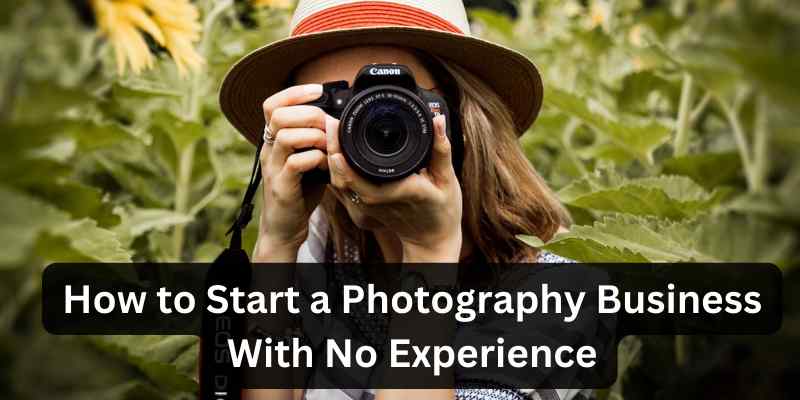Are you passionate about photography and considering starting your own business? Starting a photography business can be an exciting venture, even if you don’t have prior experience in the field. With the right approach and a solid plan, you can turn your passion for photography into a successful business. In this article, we will guide you through the steps to start a photography business from scratch, even if you have no prior experience.
The Importance of Passion in Photography
Photography is an art that requires a keen eye, creativity, and a love for capturing moments. Even without prior experience, your passion for photography can be the driving force behind your business. It will motivate you to learn and grow as a photographer while providing unique perspectives to your clients. So, embrace your passion and let it guide you on this entrepreneurial journey.
Research and Learn
Before starting a photography business, it’s essential to conduct thorough research and learn about the industry. Understand the market demand, target audience, and competitors. Explore various photography styles, techniques, and equipment to expand your knowledge. Take online courses, attend workshops, and join photography communities to enhance your skills and gain valuable insights.
Define Your Niche
Identifying your niche is crucial in a competitive photography industry. Determine the type of photography you want to specialize in, such as wedding photography, portrait photography, landscape photography, fashion photography, or product photography. Focusing on a specific niche allows you to tailor your services and attract the right audience, setting you apart from general photographers.
Create a Business Plan
A well-structured business plan will serve as your roadmap to success. Outline your goals, target market, marketing strategies, financial projections, and growth plans. Include details about your pricing, expenses, and potential revenue sources. A solid business plan will help you stay focused, make informed decisions, and secure funding if needed.
Set Up Your Photography Equipment
Invest in quality photography equipment that suits your niche and budget. Start with the essentials, such as a reliable camera, lenses, tripod, lighting equipment, and editing software. Research different brands, compare prices, and read reviews before making your purchase. As you gain experience and grow your business, you can gradually upgrade and expand your gear.
Build an Impressive Portfolio
A compelling portfolio is essential to showcase your skills and attract potential clients. Start by collaborating with friends, family, or local models to create a diverse collection of high-quality photographs. Focus on your niche and highlight your unique style. Regularly update your portfolio with your best work and consider creating an online portfolio website to showcase your talent.
Establish an Online Presence
In today’s digital age, having a strong online presence is crucial for any business. Create a professional website that showcases your portfolio, services, and contact information. Utilize social media platforms like Instagram, Facebook, and Pinterest to showcase your work, engage with your audience, and reach potential clients. Regularly update your social media accounts with new content and interact with your followers. Engage with photography communities, join relevant forums, and contribute valuable insights to establish yourself as an expert in your niche.
Pricing Your Services
Determining the right pricing for your photography services can be challenging, especially when starting out. Research the market rates in your area and consider factors such as your experience, niche, overhead costs, and the value you provide. Start by offering competitive introductory prices or special packages to attract clients while building your reputation. As you gain experience and establish your brand, you can adjust your pricing accordingly.
Marketing and Promotion
Effective marketing strategies are essential to attract clients and grow your photography business. Develop a comprehensive marketing plan that includes online and offline strategies. Utilize social media platforms, create engaging content, collaborate with influencers or local businesses, and leverage the power of word-of-mouth referrals. Invest in online advertising, optimize your website for search engines, and participate in photography contests or exhibitions to gain exposure.
Networking and Collaboration
Networking plays a crucial role in the photography industry. Attend industry events, join photography associations, and connect with other professionals in your field. Collaborate with makeup artists, stylists, event planners, and other professionals to expand your network and offer comprehensive services to clients. Building relationships with other photographers can also lead to valuable referrals and collaborative opportunities.
Stay Updated and Keep Learning
The photography industry is constantly evolving with new techniques, equipment, and trends. Stays updated with the latest advancements and continue to enhance your skills. Attend workshops, seminars, and online courses to learn from industry experts. Experiment with different styles and techniques to develop your unique artistic voice. Continuous learning and growth will not only keep you competitive but also fuel your passion for photography.
Provide Exceptional Customer Service
Delivering outstanding customer service is crucial for building a strong reputation and attracting repeat clients. Communicate clearly with your clients, understand their needs, and exceed their expectations. Be prompt in responding to inquiries, deliver projects on time, and provide a personalized experience. Your professionalism and dedication to customer satisfaction will set you apart from competitors.
Manage Finances and Legal Requirements
As a business owner, it’s essential to have a clear understanding of your finances and comply with legal requirements. Separate your personal and business finances, keep track of income and expenses, and consider hiring an accountant to ensure proper financial management. Register your business, obtain any necessary licenses or permits, and familiarize yourself with copyright laws and client contracts to protect your work and rights.
Scale and Expand Your Business
Once you have established a strong foundation, consider scaling and expanding your photography business. Hire assistants or second shooters to accommodate larger projects. Offer additional services such as photo editing, printing, or album design. Explore opportunities to diversify your revenue streams, such as teaching photography workshops or selling prints online. Continuously evaluate your business strategies and adapt to the evolving market to stay competitive.
Conclusion
Starting a photography business without prior experience is challenging but not impossible. With passion, dedication, and a strategic approach, you can turn your love for photography into a thriving business. Remember to continuously learn, adapt to market demands, and provide exceptional customer service. Embrace the journey, enjoy the creative process, and watch your photography business grow.
FAQs: Photography Business
Can I start a photography business without any formal training?
- Yes, formal training is not a requirement to start a photography business. With practice, self-learning, and continuous improvement, you can develop your skills and succeed in the industry.
How do I find my photography niche?
- To find your niche, experiment with different photography genres to discover what resonates with you the most. Consider your interests, strengths, and market demand to define your niche.
How much should I charge for my photography services?
- Pricing varies depending on factors such as your experience, niche, location, and the value you provide. Research the market rates in your area and consider your costs and the desired profit margin when determining your pricing.
How can I market my photography business effectively?
- To market your photography business effectively, develop a comprehensive marketing plan that includes online and offline strategies. Utilize social media platforms, create engaging content, collaborate with influencers or local businesses, and leverage word-of-mouth referrals. Invest in online advertising and optimize your website for search engines.
What legal requirements do I need to consider when starting a photography business?
- When starting a photography business, it’s important to register your business, obtain any necessary licenses or permits, and familiarize yourself with copyright laws and client contracts to protect your work and rights. Consult with a legal professional to ensure compliance with local regulations.


